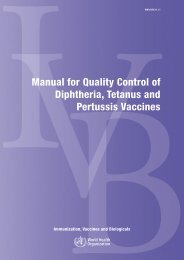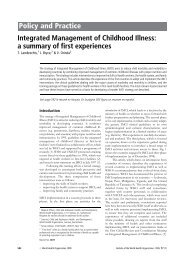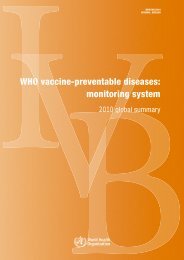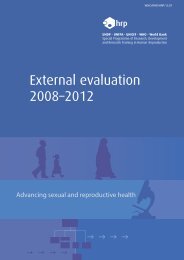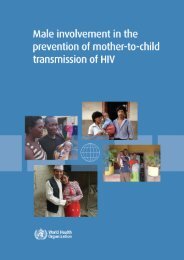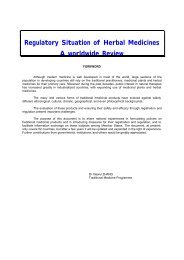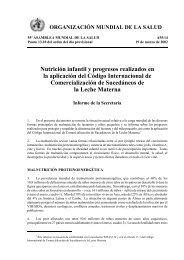IPDE - Extranet Systems - World Health Organization
IPDE - Extranet Systems - World Health Organization
IPDE - Extranet Systems - World Health Organization
Create successful ePaper yourself
Turn your PDF publications into a flip-book with our unique Google optimized e-Paper software.
87 Discussion and Conclusions<br />
Frequency of personality disorder types<br />
The study had a very limited and specific objective, namely, to determine<br />
the reliability, stability, and clinical and cultural acceptability of a<br />
particular diagnostic instrument designed for worldwide use. In the<br />
absence of any prior evidence that PDs wuld be reliably and meaningfully<br />
assessed on a worldwide basis, it would have been premature and<br />
ill-advised to have broadened the scope of the project. The development<br />
of an acceptable instrument for case identification was a necessary prerequisite<br />
to any attempt at international wllaborative or comparative<br />
studies of the PDs. The study was not intended to be an epidemiological<br />
survey of residents in the community or those under treatment. The sampling<br />
did not involve consecutive admissions, and there are obviously<br />
different thresholds associated with the request for mental health care in<br />
different cultures. Therefore, it would be imprudent to make tw much of<br />
variations in the frequency with which the individual disorders were<br />
diagnosed at the various centres.<br />
It is noteworthy, however, that most of the specific personality disorders<br />
in the two classification systems were observed in the 11 nations<br />
represented in the study. It is also of some interest that the two most frequently<br />
diagnosed types in the sample as a whole are disorders that were<br />
not included in either ICD-9 or DSM-11. They are borderline (DSM-III-<br />
R) or emotionally unstable, borderline type (ICD-10). and avoidant<br />
(DSM-III-R) or anxious (ICD-10). At least one case of these two disorders<br />
occurred at every centre with the exception of Bangalore, which<br />
did not report an avoidant diagnosis.<br />
Two controversial disorders, sadistic and self-defeating, are not<br />
included in ICD-10, were relegated to the appendix of DSM-III-R, and<br />
do not appear at all in DSM-IV. Both were among the three least frequent<br />
diagnoses in the entire sample. Interestingly, the third, narcissistic,<br />
was not included in DSM-11 and is still not recognized in ICD-10. It<br />
occurred in only 1.3% of patients in the study. This contrasts with passive-aggressive,<br />
which is not included in either ICD-10 or DSM-N but<br />
was diagnosed in 5% of study patients and appeared in all centers except<br />
Bangalore.<br />
CO-occurrence of mental disorders in the same patient<br />
Not only did the majority of patients have other mental disorders in addition<br />
to PDs, but many also had more than one type of PD. Of the 366<br />
patients with a DSM-111-R personality disorder diagnosis, 11 1 (30.3%)




